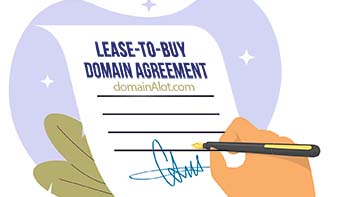How to Spot Undervalued Domains Before Everyone Else
Domain Owners No Longer Need To Hope For A Sale In Order To Generate Revenue

In the domain investing world, the concept of "undervalued" often comes down to perception. A name that looks ordinary today might be worth a fortune tomorrow but only if you have the foresight to see where demand is headed. This ability to spot value early is what gives experienced investors a real edge. And despite what you may think, it's not luck that investors rely on, it's pattern recognition, market awareness, and understanding what drives brand value.
Market Indicators
Let's say you're browsing available domains and you come across something like GreenFleets.com. On the surface, it might not seem like much. In fact, the vast majority of high-value Premium Domains rarely do. But if you're paying attention to the growing push for electrification in the logistics industry, you might recognise this as a strong future play. Why? Because major companies are investing billions into sustainable transportation, and fleet operators are looking for ways to reposition themselves as green, environmentally friendly players. So, while it might not pass the mechanisms that large domain registrars try to instil are the criteria for assessing the value of a domain, a name like GreenFleets.com could be highly brandable for a startup or consulting company serving that space. Right now, the domain might be available to register or buy for a few hundred dollars. In a year or two, it could sell for thousands.
Anticipation Is Key
This is where trendspotting comes in. You don't need to chase hype, but you should be looking a step ahead, and always aiming to stay that way.
Reading startup funding reports is a great way to begin. They often provide insight into what tech incubators are currently investing in, and where markets are moving towards. Pay attention to news out of trade shows, not just headlines.
When OpenAI first hit the mainstream, domains related to prompt engineering or AI tools started to spike in value. Investors who picked up names like PromptPilot.com or AutoPrompt.io early were able to flip them quickly for a profit.
Speculation
Today, it's almost impossible to register any .ai web domain under six characters in length, and even nonsensical, made up words with no meaning whatsoever like prpt.ai, or qrit.ai, have all disappeared, thanks to a market trend that quickly escalated into a phenomenon, and one where speculation is wild. This perhaps, is what defines the most fundamental difference in domain buying.
A domain investor often has a clear plan based upon what they perceive will be an emerging market, product, service, or segment. A domain speculator is one who comes late to the party. They're not predicting markets, they're following them and trying to cash in at the same time.
Investment Strategy
There's nothing wrong with either approach to domain buying, and one could easily argue that a domain speculator has a far better opportunity to generate profit. For example, registering a hundred domains in the hope of selling just one could easily pay for the other ninety-nine if the right domain met the right buyer. Certainly, this is a trend currently happening within the. ai top-level domain. But if we go back to OpenAI once again, we can see how domain speculation has been fuelled.
In 2023, the web domain AI.com sold for $11 million USD making it one of the top ten most expensive domains ever sold. At the time, the buyer was anonymous and aware of not wanting to start a market trend. However, it was only after the launch of ChatGPT that the world learned the AI.com domain redirected to https://chat.openai.com/chat and confirm OpenAI as the buyer. The owner of AI.com certainly made a wise investment when first registering the domain, and despite what domain investors hope, not a single AI related domain sold since is anywhere near as valuable as the one OpenAI purchased.
A Valuable Asset Doesn't Need To Be Worth Millions
In the .ai top-level domain segment, domain owners are literally clamouring to register anything that might sound like it could possibly become a brand in the future. Don't believe me? As of January 2025, Domain Name Wire reported that there were now over five hundred and seventy thousand .ai domains registered. Guess how many were registered before OpenAI bought AI.com? Less than one hundred and fifty thousand. Now guess how many .ai domains have been registered between January of this year and June? Over two hundred thousand. In other words, more in just the past five months than ever before the launch of ChatGPT.
Beneath The Hood
For the savvy domain investor uninterested in jumping on the band wagon, expired domains are another area where undervalued assets hide. These domains can come with SEO value, type-in traffic, or branding potential that hasn't yet been capitalised on. A domain like BestMealKits.com might have expired after someone abandoned a project. But with the meal kit industry still growing steadily, it could be resold to a niche blogger, affiliate marketer, or new brand looking to enter the space. If the domain has clean backlinks and some historical traffic, then it's even more valuable.
Size Isn't Everything But It Helps
A critical aspect of domain value is structure. Short, one- or two-word names are easier to remember, more brandable, and considered more trustworthy. Naturally, this translates into perceived value. Names that pass the "radio test" (easy to say and spell) tend to perform better in resale value. But within that, niche focus can create unique opportunities, and again, it is here where an experienced domain investor will largely profit. For example, a domain like DogAllergyHelp.com might not appeal broadly, but for a pet care company with a targeted product, it hits all the right notes. It's descriptive, specific, and serves a clear search intent. Something every domain investor should consider in their assessment of buying a domain intended for sale.
Instinct
As humans, we tend to instinctively overlook things that are unfamiliar to us. If you're not allergic to pollen, chances are you know little to nothing about it. But if you are, then you most likely know at which times of the year which trees produce which pollen and for how long they pollenate. The same can be said for domains and domain investors, especially in unfamiliar industries. What I mean is, if you don't understand biotech for example, you might scroll past a name like RNAInsights.com without giving a second thought. However, for someone who follows biotech startups, that name might signal massive potential, and in instances where the domain investor is ahead of the curve, i.e., saw an opportunity and registered the name before a company sought to do so. It also has the potential to be an extremely profitable one. Sometimes the best deals are the ones you don't fully understand yet.
Advice For The Faint Of Heart
Not everyone knows the art of the deal, and not everyone is schooled in negotiation tactics. Thankfully, to be a domain investor, and to learn how to spot undervalued domains, you don't need to know either.
Staying ahead of the market, comes from spending time learning about it. From learning about things outside of your own comfort zone. The best, and easiest way to start, is to subscribe to niche newsletters. Skim product launch platforms like Product Hunt. Browse tech job boards to see what roles are trending, because chances are you'll discover clues. Some may be subtle, others less so, but nonetheless, these signals can help guide you into understanding what is about to matter, and which domains will matter with it.
To Conclude
In short, undervalued domains are everywhere, but the key to their profitability is context.
Anyone can claim a domain is worth millions, but if no one is willing to buy it for millions then what is it actually worth? The truth is, precisely what you paid to register it, because that's what you as a buyer, did.
Registering hundreds or thousands of domains and claiming that their value is suddenly worth hundreds or thousands of times more than what you paid for them does not make you a domain investor. It might make you an opportunist, but is there even an opportunity to be had?
Every market relies upon two basic dynamics. Supply and demand. If there's an abundance of houses for sale in your area, then the chances of you being able to sell your home are small. The chances of you being able to get what you think your property is worth, are even smaller. Why? Because supply outweighs the demand. However, if there's no houses for sale in your area, not only might you get your asking price. You might well surpass it. Why? Because demand outweighs the supply.
The domain industry is no different, and right now there is an overwhelming surplus of domains on leading marketplaces. You need only look at Sedo to see there are over twenty four million domains waiting to be sold. With that kind of supply, buyers can choose not only to be picky, but they can happily drive the valuation of any domain down, because the alternative for the domain owner is to sit with a domain they were hoping to sell. So, for the domain opportunist, competition is tough. Arguably, it rarely exists, and for every domain that is sold not for millions, but for tens of thousands of dollars, there are millions more unable to be sold.
That said, for the domain investor willing to work. To learn. To invest time and effort into studying markets. To combine curiosity with strategic thinking, and to act before others do. You can position yourself to uncover assets that others miss entirely. Undervalued assets of greater worth. And isn't that the point of any investor?





